COVID-19 Resources for Health Care Providers & Facilities
Note: Providers or health care facilities, please email Cindy Bruzzese for a copy of the UVMMC COVID Palliative Care Provider Toolkit.
Vaccines and Other Novel Therapeutics
Ethical Challenges in the Middle Tier of Covid-19 Vaccine Allocation: Guidance for Organizational Decision-Making (The Hastings Center)
Guidance that aims to help structure discussion of ethical concerns in responding to COVID-19 and to support collaboration across institutions throughout pandemic response and recovery.
VisitVermont COVID-19 Vaccine Planning
Information and resources from the Vermont Department of Health related to Vermont's COVID-19 vaccine access and distribution plan.
VisitFact Sheet for Healthcare Providers Administering the Pfizer-BioNTech COVID-19 Vaccine
Instructions and requirements for Pfizer-BioNTech COVID-19 vaccine providers.
DownloadPrioritizing the 1a: Ethically Allocating Scarce Covid Vaccines to Health Care Workers (The Hastings Center)
An article outlining ethical considerations that should inform the allocation of scarce Covid-19 vaccines to those at the head of the line.
VisitGlobal Allocation of Coronavirus Vaccines (The Hastings Center Bioethics Forum)
An article arguing that nations should balance concerns for their own citizens with global obligations as they work to allocate the COVID-19 vaccine.
Visit10 Things Healthcare Professionals Need to Know About U.S. COVID-19 Vaccination Plans (CDC)
A list of the top 10 things healthcare professionals need to be aware of related to where plans for COVID-19 vaccination availability currently stand.
VisitCOVID-19 Emergency Use Authorizations (FDA)
A current list of Emergency Use Authorizations (EUAs) issued by the U.S. Food & Drug Administration (FDA) for COVID-19 Medical Countermeasures (MCMs).
VisitFDA Fact Sheet on Emergency Use Authorization (EUA) for COVID-19 Convalescent Plasma Use
This fact sheet is designed for patients and parents/caregivers to help understand the risks and benefits of taking COVID-19 convalescent plasma.
DownloadEthics Considerations for Bamlanivimab Allocation: Interim Ethical Guidance for VT Dept of Health (VEN and UVM Health Network)
Guidance about monoclonal antibody therapy allocation with ethics advice from two different perspectives as prepared by Vermont Ethics Network and UVM Health Network.
DownloadHealth Equity
Undocumented Immigrants and Covid-19 Vaccination (The Hastings Center)
An article explaining how fear of deportation may be a deterrent to vaccination of undocumented immigrants and what can be done about it from a public health perspective.
VisitAdvancing Social Justice, Health Equity, and Community (The Hastings Center)
Professor Patrick T. Smith of Duke University and Mildred Solomon, president of The Hastings Center, explore how thinking and insights afforded by Martin Luther King, Jr. and the 20th century civil rights movement might help redress today’s widespread suffering and health inequities.
VisitCovid-19 Makes Clear that Bioethics Must Confront Health Disparities (The Hastings Center)
An essay on how the pre-existing condition of health care disparities led to the disproportionate burden on vulnerable communities from COVID-19 and how now is the time for bioethics to broaden its gaze and appreciate that rights without opportunity ring hollow.
VisitBlack Lives in a Pandemic: Implications of Systemic Injustice for End‐of‐Life Care (The Hastings Center Report)
An essay arguing that racial health and health care disparities, rooted as they are in systemic injustice, ought to carry far more weight in clinical ethics than they generally do. In particular, this essay examines palliative and end‐of‐life care for African Americans, highlighting the ways in which American medicine, like American society, has breached trust.
VisitThe COVID-19 Pandemic Shows Why We Must—And How We Can—End Racial Injustice in Health (TIME)
An article detailing how we can turn shared anger into action through four concrete actions.
VisitQuestions of Bias in Covid-19 Treatment Add to the Mourning for Black Families (The New York Times)
An article detailing how for many black families, mourning coronavirus deaths brings an added burden as they wonder whether racial bias may have played a role.
VisitUnblinded: Systematic Racism, Institutional Oppression, and Colorblindness (Bioethics.net)
An article explaining how colorblind ideology is an incapacity to understand how situations affect black Americans differently. The author states that to truly take on the job of addressing inequity in COVID-19, we need to be unblinded.
VisitBlack Women Can’t Breathe (The Hastings Center)
An essay on the troubling ways in which Black women are continuously marginalized, even as they seek medical care. Systemic racism in health care, expressed through implicit and explicit biases, causes their health to suffer.
VisitSome Lives Matter: The Dirty Little Secret of the U.S. Health Care System (The Hastings Center Report)
An article detailing how the inequity of sickle cell disease treatment and access is representative of larger societal problems with the U.S. healthcare system, including those demonstrated by the disproportionate impact of COVID-19 on Black and Latinx populations.
VisitStructural Racism, White Fragility, and Ventilator Rationing Policies (The Hastings Center)
An article outlining how bioethicists must stop denying that structural racism exists in health care policy and that it can kill.
VisitImmigrants, Health Inequities, and Social Citizenship in Covid-19 Response and Recovery (The Hastings Center)
An article explaining how in this evolving public health crisis and its long recovery, recognizing immigrants as social citizens of the places where they live and work and mitigating their embodied vulnerabilities should be integral to public health ethics.
VisitHastings Center President Speaks on Systemic Racism, Health Inequities, and Covid-19
A recent talk from the president of The Hastings Center that points out the opportunity this pandemic gives us to recognize longstanding health inequities and the ethical imperative of addressing social determinants of ill health.
VisitThe Way We Ration Ventilators Is Biased (The New York Times)
An article exposing how the model guidance for rationing ventilators has deeply embedded biases that disadvantage groups who experience worse health because of historical and structural reasons.
VisitEthics & Policy Considerations for Reopening the Economy
When to Reopen the Nation is an Ethics Question—Not Only a Scientific One (The Hastings Center)
An article explaining how deciding how to move forward is a decision about values, not just data.
VisitGrappling With the Ethics of Social Distancing (Johns Hopkins Berman Institute of Bioethics)
A working paper that provides a framework for evaluating social distancing policies and reopening plans.
VisitRoadmap to Pandemic Resilience (Edmond J. Safra Center for Ethics at Harvard University)
A comprehensive operational roadmap for mobilizing and reopening the U.S. economy in the midst of the COVID-19 crisis.
VisitShow Me Your Passport: Ethical Concerns About COVID-19 Antibody Testing as Key to Reopening Public Life (The Hastings Center)
An article exploring the ethics, including obstacles and disparities, of so-called immunity passports.
VisitAllocating Scarce Resources: Model Policies and Additional Guidance
UVM Health Network Plan for Ethical Allocation of Hospital Beds and Mechanical Ventilators During the COVID-19 Epidemic
Guidelines that aim to clarify a pragmatic approach to the wise allocation of hospital beds and mechanical ventilators for use by frontline health care workers. This policy is being discussed with various stakeholders and will be updated as needed.
VisitAdditional Guidance for Hospital Ventilator Allocation Policies
By Doug White, MD, MAS, Endowed Chair for Ethics in Critical Care Medicine at the University of Pittsburgh Medical Center and Director of the Program on Ethics and Decision Making in Critical Illness
VisitVentilator Allocation Guideline by New York Task Force on Life and the Law
Clinical ventilator allocation protocols in New York state.
VisitEthical Considerations for Allocation of Vents During a Pandemic (CDC)
A comprehensive look at priorities for allocation, principles that should guide allocation, who should make allocation decisions, and other considerations.
VisitThe Toughest Triage — Allocating Ventilators in a Pandemic (New England Journal of Medicine)
An ethical perspective on the prospect of rationing ventilators during the COVID-19 pandemic.
VisitWhat US Hospitals Should Do Now to Prepare for a COVID-19 Pandemic
An article that offers American hospital administrators and clinicians specific judgment on what hospitals should do to prepare for a COVID-19 pandemic.
VisitProjected Hospital Resource Use During COVID-19 (Institute for Health Metrics & Evaluation)
Projections and data visualizations of hospital resource use for the U.S. and by state (indicates projected peak and how many overall beds, ICU beds, and ventilators will be needed).
VisitCOVID-19: Advice From the Front Lines (American College of Chest Physicians)
Interviews with physicians who are on the frontlines as webinars and on-demand content, including a discussion on triage of critical care resources.
VisitEthics Considerations & Resources
Ethical Framework for Health Care Institutions & Guidelines for Institutional Ethics Services Responding to the Coronavirus Pandemic (The Hastings Center)
A guidance document designed for use within a health care institution’s preparedness work, supplementing public health and clinical practice guidance on COVID-19.
VisitEthics Resources on the Coronavirus (The Hastings Center)
A compilation of ethics resources for responding to the Coronavirus.
VisitSupporting Ethical Care and Responding to Moral Distress in a Public Health Emergency (The Hastings Center)
A slide deck with guidance, tools, and resources for Hospital Ethics Committees (HECs) and Clinical Ethics Consultation (CEC).
VisitResponding to COVID-19 as a Regional Public Health Challenge: Preliminary Guidelines for Regional Collaboration Involving Hospitals (The Hastings Center)
A supplement to The Hastings Center's Ethical Framework that aims to help structure discussion of ethical concerns in responding to Covid-19 as a regional public health challenge and support collaboration across institutions throughout pandemic response and recovery.
VisitAcccess to Therapeutic and Palliative Drugs in the Context of COVID-19: Justice and the Relief of Suffering
A supplement to The Hastings Center's Ethical Framework that aims to to help structure discussion of significant, foreseeable ethical concerns in responding to Covid-19 and to support collaboration across institutions throughout pandemic response and recovery.
Read ArticleOn the Verge of Making Triage Decisions: Understanding Justice in Medicine
by Rosamond Rhodes, Ph.D., Professor of Medical Education, Director of Bioethics Education, Icahn School of Medicine at Mount Sinai
VisitPandemic Justice: Clarifying Guidance for Resource Allocation (Bioethics.net)
An article by Rosamond Rhodes, Ph.D. that suggests we limit guiding principles to just three principles of justice.
VisitClinical Ethics Recommendations for the Allocation of Intensive Care Treatments in Exceptional, Resource-Limited Circumstances (SIAARTI)
A guide from Italy translated into English that addresses a potential imbalance between the real clinical needs of the population and the effective availability of intensive resources.
VisitVeteran Health Association Ethical Guidance
An ethical guide to assist VA facilities in pandemic workforce, communications, and patient care planning.
VisitWho Should Receive Life Support During a Public Health Emergency? (Annals of Internal Medicine)
An analysis of ethical principles that could guide resource allocation and a proposed strategy that balances multiple morally relevant considerations.
VisitAMA Code of Medical Ethics: Guidance in a Pandemic
Offers foundational guidance for health care professionals and institutions responding to the COVID-19 pandemic.
VisitRoles for Ethicists in COVID-19 Response (Impact Ethics)
Describes the role of health care ethicists in a pandemic.
VisitItaly in a Time of Emergency and Scarce Resources: The Need for Embedding Ethical Reflection in Social and Clinical Settings (Journal of Clinical Ethics)
A brief article offering a reflection on the public and clinical role of the bioethicist.
VisitConfronting Disability Discrimination During the Pandemic (The Hastings Center)
An essay on developing a triage protocol that will minimize rather than magnify structural discrimination, such as ableism, in the health care system.
VisitBioethics Toolkit for COVID-19 (Bioethics.net)
A collection of bioethics resources from the American Journal of Bioethics for people dealing with COVID-19.
VisitBio-Ethical Principles, Practices, and Recommendations Relevant to the COVID-19 Pandemic (International Association of Hospice and Palliative Care)
A briefing note on palliative care in the COVID-19 pandemic.
VisitIn Response to COVID-19 Pandemic Physicians Already Know What to Do (Bioethics.net)
An article that argues we should not rush to develop brand new criteria for allocating scarce resources in intensive care units (ICUs), but should instead rely on what bioethicists have learned over many years.
VisitThe COVID-19 Pandemic: Critical Care Allocated in Extremis (Bioethics.net)
A commentary on the previous article that offers additional considerations.
VisitInterim Guidance for Basic and Advanced Life Support in Children and Neonates With Suspected or Confirmed COVID-19 (American Heart Association)
Interim guidance to help rescuers treat victims of pediatric cardiac arrest with suspected or confirmed COVID-19.
VisitCommunication Tools
Conversation Toolkit For COVID-19 (TalkVermont)
A toolkit to help clinicians in our community respond to the epidemic.
VisitTalkVermont
Tools for clinicians to skillfully and compassionately engage in conversation about what matters most to them.
VisitThe Importance of Addressing Advance Care Planning and Decisions About Do-Not-Resuscitate Orders During COVID-19 (JAMA)
An article addressing the importance of providing goal-concordant care and how advance care planning should be a high priority in the context of this pandemic.
VisitCommunicating in a Crisis: Skills to Honor Previously Determined Preference for Medical Care (OHSU)
A video demonstrating practical communication techniques for having conversations about goals of care with seriously ill patients (and their surrogates) who have pre-existing COLST orders to limit treatments.
VisitCommunicating with the Public about COVID-19 and Advance Care Planning (Massachussetts Coalition for Serious Illness Care)
Public messaging guidance to support appropriate advance care planning at this time and create consistent language.
VisitProactive Care Planning for COVID-19: a Guide for Clinicians to Help Individuals (Respecting Choices)
A guide for use by clinicians to proactively help individuals at highest risk for complications associated with COVID-19 express their desires for care in the event they develop the infection.
VisitProactive Care Planning for COVID-19: a Guide for Clinicians to Help Health Care Agents (Respecting Choices)
A guide for use by clinicians to proactively help health care agents of individuals at highest risk for complications associated with COVID-19 express their desires for care, in the event the individual develops the infection.
VisitHow to Have a Proactive Care Planning Conversation in the Context of COVID-19 (Respecting Choices)
A prerecorded webinar to support clinicians in having proactive planning conversations with patients at risk for the infection and developing plans for care that align with their goals and preferences.
VisitBasic Advance Care Planning Scripts for All Outpatient Healthcare Professionals (PREPARE for Your Care)
Appropriate regardless of discipline or training - no experience necessary. Developed by PREPARE For Your Care for the COVID-19 crisis.
VisitCOVID-19: Deaf and Hard of Hearing Communication Access Recommendations for the Hospital (National Association of the Deaf)
Guidance and tools for hospitals, medical facilities, and medical professionals to provide communication services to deaf and hard of hearing patients.
VisitCOVID-19 Multilingual Video Resources (Equal Access Language Services)
A public service initiative to provide basic information about COVID-19 in as many languages as possible.
VisitCOVID-19 Resources in Indigenous Languages (CIELO)
A compilation of COVID-19 educational resources, including videos, in indigenous languages.
VisitResponding to COVID-19: A Science-Based Approach (American Public Health Association & National Academy of Medicine)
A webinar series exploring the scientific basis for guidance issued by government, health and public health organizations, as well as answers to commonly asked questions.
VisitBuilding Capacity & Supporting Health Care Workers
Critical Care for the Non-ICU Clinician (Society of Critical Care Medicine)
Online education resources for non-ICU clinicians who may be needed to care for critically ill patients as the COVID-19 pandemic spreads.
VisitSustaining Healthcare Personnel During Coronavirus (Center for the Study of Traumatic Stress)
A one-page summary on how take care of yourself and encourage others to practice self-care, which sustains the ability to care for those in need.
VisitCaring for Yourself and Caring for Others During a Disaster/Epidemic (OHSU)
A video presentation offering helpful reminders for each of us as we work to meet the challenge of this epidemic.
VisitManaging Workload and Referrals During Peak or Crisis Periods (Center to Advance Palliative Care)
How to proactively work with key referring providers to manage workload and adjust team processes and priorities.
VisitEmergency Health Workforce Policies to Address COVID-19 (GWU Fitzhugh Mullan Institute for Health Workforce Equity)
A webinar series that focuses on actions that we can take now to avoid entering a vicious cycle of staffing shortages.
VisitKeeping the Coronavirus from Infecting Healthcare Workers (The New Yorker)
An article by Dr. Atul Gawande on what Singapore and Hong Kong's success is teaching us about the pandemic.
VisitPalliative Care Team Health and Resiliency During the COVID-19 Pandemic (Center to Advance Palliative Care)
Nine practical, specific strategies for supporting team health during the COVID-19 pandemic.
VisitDecompress Podcast
A daily podcast from Tony Back, MD, co-founder of VitalTalk, about what health care professionals can do to sustain themselves during COVID-19.
VisitSustaining Clinical Empathy During the Pandemic (The Hastings Center)
An article on what clinicians can do to sustain and preserve empathy during the COVID-19 crisis.
VisitTips for Improving Staff Wellbeing During COVID-19 (Institute for Healthcare Improvement)
Suggestions for how to prioritize staff wellbeing and joy in work now instead of waiting for circumstances to worsen.
VisitWhat to Do and Say to Support Psychological Safety During the COVID-19 Pandemic (Institute for Healthcare Improvement)
Advice from a group of safety and quality leaders on how to preserve and foster psychological safety for those providing and managing care.
VisitConversation and Action Guide to Support Staff Wellbeing and Joy in Work During and After the COVID-19 Pandemic (Institute for Healthcare Improvement)
Actionable ideas that leaders can quickly test during the pandemic response, and which can build a longer-term foundation to sustain joy in work for the health care workforce.
VisitNursing Home Considerations
COVID-19 in Nursing Homes with Hospice Patients (NHPCO)
A short guide on visitation, with specific guidance for certain compassionate care situations, such as end-of-life, and details for hospice workers in nursing homes.
VisitGuidance for Infection Control and Prevention of COVID-19 in Nursing Homes (CMS)
Guidance from the Centers for Medicare and Medicaid Services to nursing homes to help control and prevent the spread of the virus.
VisitVermont Resources
Vermont Department of Health: Novel Coronavirus (COVID-19)
Guidance for health care professionals from VDH, including how to report suspect cases, submit resource requests, and more.
VisitVermont Department of Disabilities, Aging & Independent Living (DAIL): Novel Coronavirus Information
Information for long-term care facilities, caregivers, developmental services providers, hospitals, home-based services, and more.
VisitThe University of Vermont Health Network (UVMHN): Coronavirus (COVID-19)
Information for health care professionals, including current testing criteria, protocols, educational materials, and more.
VisitVermont Crisis Standards of Care Plan (VT Department of Health)
Comprehensive guidance on managing disasters and emergencies within the state of Vermont that threaten healthcare and public health.
VisitFederal Resources
Centers for Disease Control and Prevention (CDC): COVID-19 Information for Healthcare Professionals
Resources for healthcare professionals from the CDC, including current guidance, infection control resources, preparedness tools, and more.
VisitCenters for Medicare and Medicaid Services (CMS): Coronavirus
Information and updates from CMS, including clinical, technical, billing, coding, and coverage guidance.
VisitHospice and Palliative Care Services During COVID-19
Hospice and palliative care agencies across the state are continuing to offer services during the COVID-19 pandemic. Below are overviews by agency of the services each are delivering (we will continue to add more as they become available):
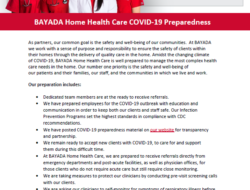 BAYADA
BAYADA
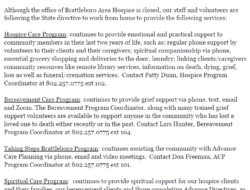 Brattleboro Area Hospice
Brattleboro Area Hospice
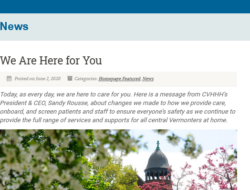 Central Vermont Home Health & Hospice
Central Vermont Home Health & Hospice
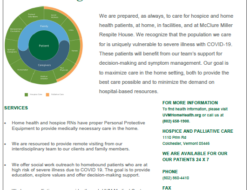 UVM Health Network Home Health & Hospice
UVM Health Network Home Health & Hospice
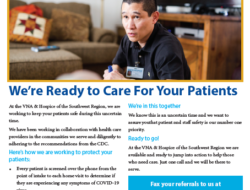 VNA & Hospice of the Southwest Region
VNA & Hospice of the Southwest Region